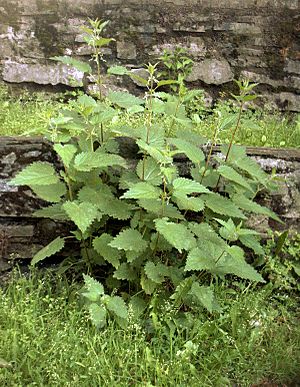Histamine facts for kids

Histamine is a special chemical found in your body. It's like a tiny messenger that helps your body in different ways. One of its main jobs is to help your immune system fight off things that might harm you. It also helps your stomach and intestines work properly and sends signals in your brain.
When your body senses something it doesn't like, like a pathogen (a germ) or something you're allergic to, histamine is released. This can cause an inflammatory response. This is why areas can get red, swollen, and sometimes itchy or painful, like when you get a bug bite or have an allergic reaction.
Histamine and Your Immune System
Histamine is a key player in your body's defense team. Special cells called mast cells and basophils produce and release histamine. These cells are found in many parts of your body, especially in connective tissues.
When histamine is released, it makes the tiny blood vessels, called capillaries, a bit more "leaky." This allows important white blood cells and other helpful proteins to easily move out of the blood vessels. They can then rush into the affected tissues to fight off invaders or deal with an injury. This process helps your body heal and protect itself.
Other Roles of Histamine
Besides its role in immune responses, histamine also has other important jobs:
- In Your Gut: Histamine helps control how your stomach produces acid and how your intestines move food along. It's important for healthy digestion.
- In Your Brain: Histamine acts as a neurotransmitter. This means it helps send messages between nerve cells in your brain. It can affect things like your sleep-wake cycle, alertness, and even your appetite.
Images for kids
See also
In Spanish: Histamina para niños
 | William L. Dawson |
 | W. E. B. Du Bois |
 | Harry Belafonte |


